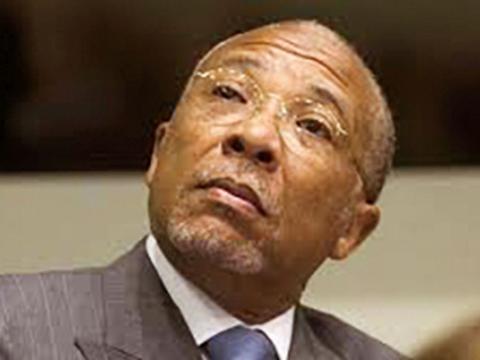By Mohamed Jaward Nyallay
The Residual Special Court of Sierra Leone (RSCSL) has rejected an application by former Liberian President Charles Taylor’s Defence Counsel to be temporarily transferred from his jail cell in the United Kingdom to a “safe third country” out of fear of the COVID-19 pandemic.
Taylor is currently serving a 50-year jail term in HMP Frankland Prison in the UK after being convicted of 11 counts of war crimes charges, which included aiding and abetting former rebels of Sierra Leone’s disbanded Revolutionary United Front.
In her 26-page ruling that was submitted to the RSCSL in Hague on Friday, the Designate Duty Judge, Justice Teresa Doherty, said the Plaintiff’s application for temporary relocation to a “safe third country” was vague. She also states that claims that the HMS Frankland was overcrowded and therefore it’s a risk to Mr Taylor’s health were not consistent with what authorities at the prison stated.
“There is no imminent danger to Mr. Taylor’s detention at HMP Frankland arising from the COVID-19 pandemic. UK prison authorities and the RSCSL (Residual Special Court for Sierra Leone) have upheld their obligations in the UK Enforcement of Sentence Agreement to ensure that Mr. Taylor's detention complies with relevant health and human rights standards during the COVID-19 pandemic,” Judge Doherty was quoted.
On the 15th of June, the Defence Counsel for Taylor, represented by Essa Faal, filed a motion to temporarily transfer their client to a safer country to serve his sentence. The Defence claimed that Taylor was old and susceptible to catch the virus considering how the pandemic has spiralled across prisons in the UK.
Taylor is 72, and therefore falls within the age bracket that has been worse affected by the pandemic globally.
“Since the World Health Organization (“WHO”) declared the COVID-19 a pandemic on 11 March 2020, a substantial number of inmates in prisons and detention centres across the United Kingdom are reported to have contracted the disease and people in overcrowded areas and older persons are among the highly and most vulnerable categories to the disease,” the Defence stated in their application.
The defence also claimed that the prison is over crowded with up to 900 inmates and no amount of social distancing will guarantee the safety of Taylor, because he shares some prison facilities with other inmates.
“Mr Taylor has not been provided with adequate personal protective equipment (PPE) and masks and has no statistics on whether that prison facility has sufficient hand washing areas and isolation rooms for all its 900 inmates,” the Defence added.
The defence further argued that denying Taylor the opportunity to be transferred could amount to the violations of his basic human rights, which is to keep him safe from danger.
Following the application, the judge asked the Defence to provide the name of the “Safe third country” that it was referring to for its client. A request the judge noted in her final report that it was never provided.
“He does not define the country which he considers a ‘third’ or a ‘safe’ country nor clarify which countries are ‘first’ or ‘second’ countries for the purposes of his application,” Doherty stated.
The defence also contended with the judge and asked her on the 1st of July to recuse herself from the application hearing, a request which Doherty refused to take and issued a statement on the 23rd of July.
The Prosecution, which is represented by James Johnson, said the plaintiff did not fully grasp the seriousness of the pandemic and wanted to use the situation to his advantage.
“Request for a transfer to an unnamed ‘safe third country’ demonstrates a woeful lack of grasp of the reality the world community faces from the threat of the COVID-19 Pandemic.” COVID-19 has […] been progressively hitting every country on the globe. To seek to be transferred as a prisoner from the UK at this time […] to an unnamed, and so-called, ‘safe third country’ is downright unthinkable” and “would place Prisoner Taylor at significantly greater danger than he currently enjoys in the relative safe confines of HMP Frankland,” the prosecution stated.
“Taylor is rather trying to capitalize on the moment basing his strategy on highly speculative non-fact scenarios and an over-stretched notion of right to protection of life obligations on authorities, to explore possibilities for a selfish gain,” it added.
The prosecutor’s office also stated that Taylor was a Grade A prisoner, which meant that he had extra protection and is not in any danger compared to ordinary prisoners because he is isolated from the general prison population.
According to the Judge’s statement, authorities at HMP denied claims that the prison is overcrowded. They also state that prisoners have had the necessary tools to prevent the outbreak of the virus in the prison.
HMP was quoted as having only 840 prisoners with “cells designed for single occupancy.” The prison says it has capacity to keep just over 850 prisoners.
The statement notes that Taylor is not in danger as his defence claimed because he was not sharing cell or washing facilities with cellmates.
Charles Taylor is considered as a major architect of Sierra Leone’s eleven years [1991-2002] civil war that claimed thousands of lives and displaced many more.
Copyright © 2020 Politico Online








